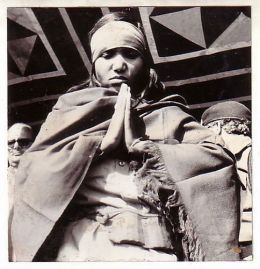She was born a low-caste “untouchable”. By the time she was twenty, she’d been raped so many times she’d lost count. But she would rise from abuse, poverty and degradation to avenge her honour and become a champion of women’s rights and heroine to millions of India’s poor. Today we pay tribute to Phoolan Devi – gunned down in New Delhi seventeen years ago aged 37.
Hers is a story so shocking that one can barely believe it’s true – but it is. When she was only 11, Phoolan’s dirt-poor family sold her into marriage to a man 20 years her senior for the price of an old cow, a rusty bicycle and 100 rupees – or slightly more than £1 at today’s exchange rate. Her husband was meant to wait three years before deflowering his child bride, but after just three months he raped her. When he abandoned her a year later, Phoolan returned to her home village where she was branded an impure deviant. The higher-caste boys believed it their right to rape her. When she resisted, she was arrested, gang-raped and beaten by the police. With nothing left to lose, she began to fight back. “I was discovering piece by piece how my world was put together: the power of men, the power of privileged castes, the power of might. I didn’t think of what I was doing as rebellion; it was the only means I had of getting justice.”
In 1979, Phoolan either voluntarily joined or was abducted by a gang of dacoits – or bandits – operating in the ravines of northern India. This is where the legend of Phoolan Devi as a modern-day Robin Hood was born. Toting guns and disguised as police officers, Phoolan and her gang targeted high-caste villages and shared the spoils with the poor and downtrodden. She and the dacoit leader, Vikram Mallah, became lovers – the first man who’d ever shown her kindness and treated her as an equal. Together, they paid an unexpected visit to the man who’d raped and beaten her when she was 11 years old. Phoolan stabbed her ex-husband in the groin and left him naked by the side of the road with a note in his mouth, “Warning: this is what happens to old men who marry young girls!”
After less than a year together, Vikram Mallah was killed. Phoolan became the hostage of a rival gang leader, who held her captive in the village of Behmai where she was once again subjected to repeated rape by bandits and upper-caste landowners. After she managed to escape and rejoin her gang, Phoolan led a notorious act of revenge known as the Saint Valentine’s Day massacre; some 20 of Behmai’s upper-caste Thakurs were rounded up and shot in retribution for her gang rape. News of the massacre spread, and Phoolan became a living legend – glorified by the Indian media, and heralded by the masses as an incarnation of the warrior goddess Durga. “Each day, she was more fierce, each day more beautiful,” Barry Bearak described her in the New York Times.
For two years she evaded the law. Prime Minister Indira Gandhi suggested that since they couldn’t catch her, Phoolan should be offered amnesty. Phoolan accepted, surrendering her weapons in front of portraits of Mahatma Gandhi and the goddess Durga. She spent the next 11 years in prison without trial. But here the story gets even more fantastic. In 1994, the state of Uttar Pradesh threw out the high-caste rulers and the new government released Phoolan Devi from prison. She found a loyal local following among women and the poor who in 1996 elected the illiterate Bandit Queen to represent them in Parliament. As the Chicago Tribune wrote, “What made her so charismatic was not her history of violence and retribution but the blunt way she explained that there was no alternative or legal recourse in India for an illiterate Dalit peasant girl abused by high-caste men [and] ignored by the police.” Phoolan was in the middle of a second parliamentary term, returning home for a midday meal, when she was shot dead by a still unknown assailant.
And so the woman who had lived by the gun died by the gun. Phoolan herself had predicted as much: “I was born into violence, I will die with violence. This is my fate.” It was nevertheless a tragic end for this beyond brave heroine who’d waged a holy war against the evils of caste and gender exploitation. A true avenging angel of the poor and dispossessed. And, as Britain’s own justice secretary seeks to diminish sentences for “date rapes” because they’re not “serious”, let us never forget that she exacted revenge and justice from her monstrous attackers in a country that still expects a ‘code of silence’ from lower-caste rape victims – even though that vile social structure was meant to have been abolished in 1948.
“You can call it rape in your fancy language. Do you have any idea what it’s like to live in a village in India? What you call rape, that kind of thing happens to poor women in the villages every day. It is assumed that the daughters of the poor are for the use of the rich.” – Phoolan Devi



8 Responses to 25th July 2001 – the Death of Phoolan Devi